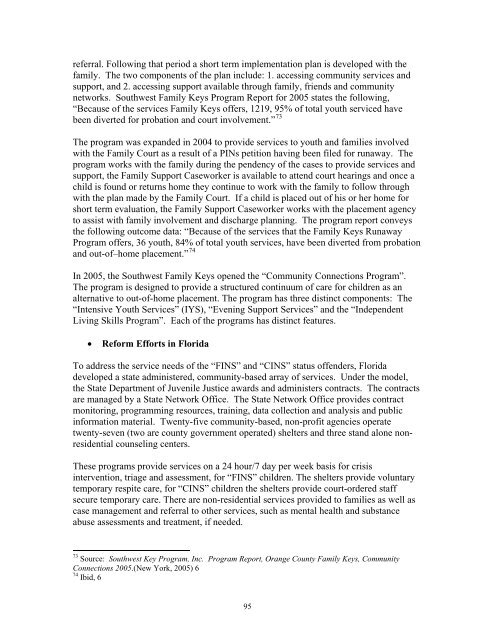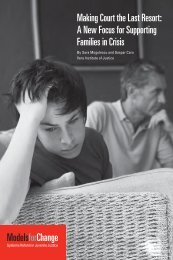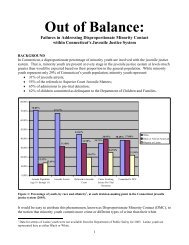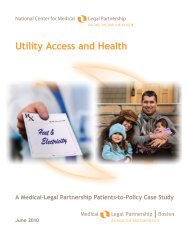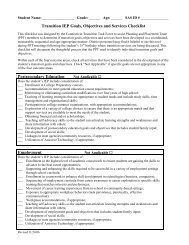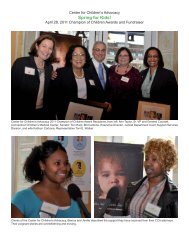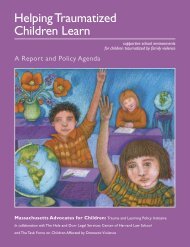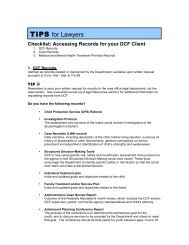FWSN-advisorybd-repo.. - The Connecticut Juvenile Justice Alliance
FWSN-advisorybd-repo.. - The Connecticut Juvenile Justice Alliance
FWSN-advisorybd-repo.. - The Connecticut Juvenile Justice Alliance
You also want an ePaper? Increase the reach of your titles
YUMPU automatically turns print PDFs into web optimized ePapers that Google loves.
eferral. Following that period a short term implementation plan is developed with the<br />
family. <strong>The</strong> two components of the plan include: 1. accessing community services and<br />
support, and 2. accessing support available through family, friends and community<br />
networks. Southwest Family Keys Program Report for 2005 states the following,<br />
“Because of the services Family Keys offers, 1219, 95% of total youth serviced have<br />
been diverted for probation and court involvement.” 73<br />
<strong>The</strong> program was expanded in 2004 to provide services to youth and families involved<br />
with the Family Court as a result of a PINs petition having been filed for runaway. <strong>The</strong><br />
program works with the family during the pendency of the cases to provide services and<br />
support, the Family Support Caseworker is available to attend court hearings and once a<br />
child is found or returns home they continue to work with the family to follow through<br />
with the plan made by the Family Court. If a child is placed out of his or her home for<br />
short term evaluation, the Family Support Caseworker works with the placement agency<br />
to assist with family involvement and discharge planning. <strong>The</strong> program <strong>repo</strong>rt conveys<br />
the following outcome data: “Because of the services that the Family Keys Runaway<br />
Program offers, 36 youth, 84% of total youth services, have been diverted from probation<br />
and out-of–home placement.” 74<br />
In 2005, the Southwest Family Keys opened the “Community Connections Program”.<br />
<strong>The</strong> program is designed to provide a structured continuum of care for children as an<br />
alternative to out-of-home placement. <strong>The</strong> program has three distinct components: <strong>The</strong><br />
“Intensive Youth Services” (IYS), “Evening Support Services” and the “Independent<br />
Living Skills Program”. Each of the programs has distinct features.<br />
• Reform Efforts in Florida<br />
To address the service needs of the “FINS” and “CINS” status offenders, Florida<br />
developed a state administered, community-based array of services. Under the model,<br />
the State Department of <strong>Juvenile</strong> <strong>Justice</strong> awards and administers contracts. <strong>The</strong> contracts<br />
are managed by a State Network Office. <strong>The</strong> State Network Office provides contract<br />
monitoring, programming resources, training, data collection and analysis and public<br />
information material. Twenty-five community-based, non-profit agencies operate<br />
twenty-seven (two are county government operated) shelters and three stand alone nonresidential<br />
counseling centers.<br />
<strong>The</strong>se programs provide services on a 24 hour/7 day per week basis for crisis<br />
intervention, triage and assessment, for “FINS” children. <strong>The</strong> shelters provide voluntary<br />
temporary respite care, for “CINS” children the shelters provide court-ordered staff<br />
secure temporary care. <strong>The</strong>re are non-residential services provided to families as well as<br />
case management and referral to other services, such as mental health and substance<br />
abuse assessments and treatment, if needed.<br />
73 Source: Southwest Key Program, Inc. Program Report, Orange County Family Keys, Community<br />
Connections 2005.(New York, 2005) 6<br />
74 Ibid, 6<br />
95


